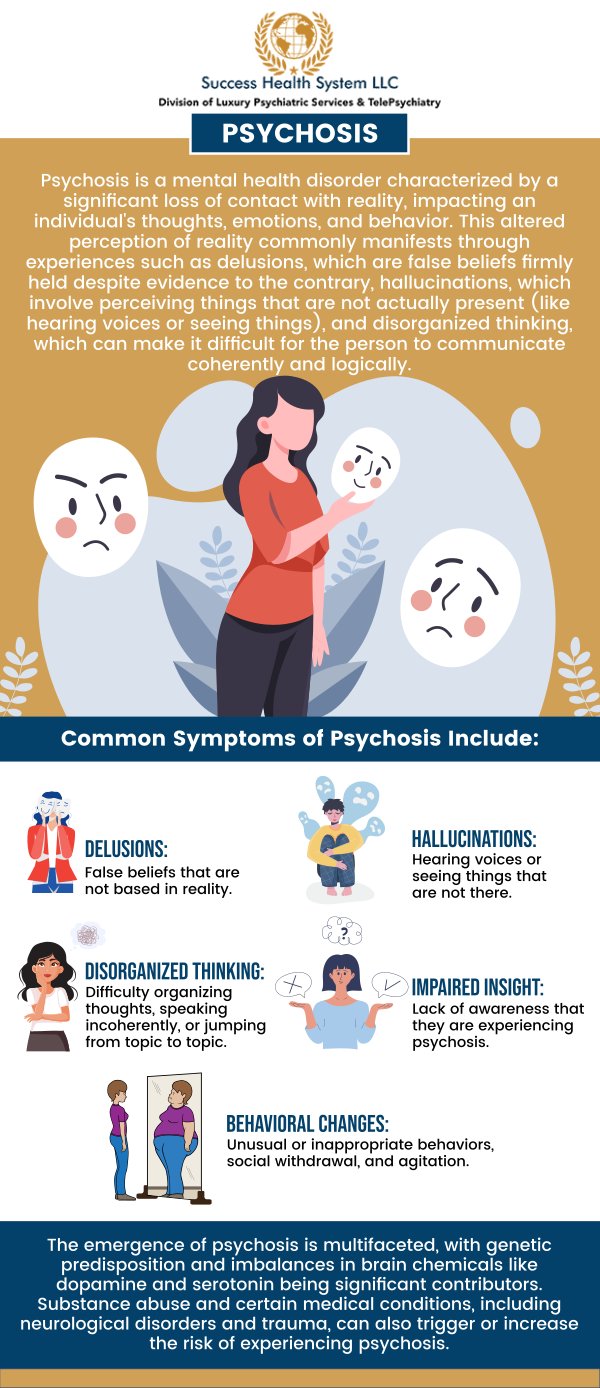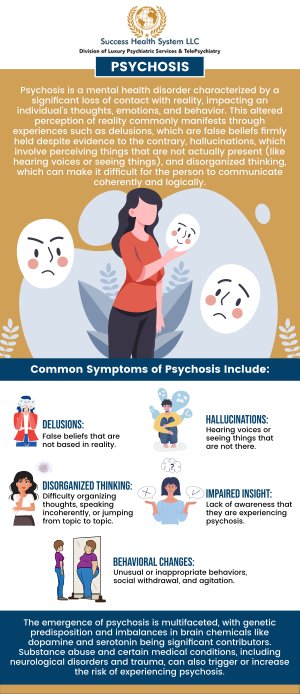Psychosis Therapist in Creve Coeur, MO
Psychosis can be treated in various ways, often with the best results achieved through a combination of therapy and medication. Dr. Moses Tabe Ambilichu, M.D., a board-certified psychiatrist and mental health specialist at Success Health System LLC, provides quality care for all your mental health concerns. Dr. Ambilichu takes a holistic approach, tailoring treatment plans to each patient’s unique needs. Our goal is to support your mental well-being and recovery every step of the way. For more information, please contact us today at Success Health System LLC or book an appointment online. We are conveniently located at 12401 Olive Boulevard, Suite 206, Creve Coeur, MO 63141.




Table of Contents:
What are the signs of being psychotic?
What triggers psychosis?
What are some different types of psychosis?
What are some major symptoms of the psychotic disorder?
Psychosis is a condition in which the relationship between the individual and reality is impaired. It can be a sign of serious mental health problems. A person suffering from psychosis may experience hallucinations or delusions.
A hallucination occurs when sensory experiences occur without a stimulus. If a person has an auditory hallucination, they may hear someone speaking when they are not around. A person experiencing a visual hallucination may see something that isn’t actually there, such as a person standing in front of them.
It is also possible for someone experiencing psychosis to think contrary to what is actually true, these thoughts are known as delusions. Psychosis may also cause people to lose motivation and withdraw from social situations. It can be frightening to experience psychosis symptoms and patients may also hurt themselves or others as a result of them.
If you or someone you know is experiencing symptoms of psychosis, seek medical attention immediately.
In most cases, doctors do not know what causes psychotic disorders. Researchers believe that a number of factors contribute to the problem. A family history of psychotic disorders can lead to the disorder being inherited in part. Stress, drug abuse, and major life changes may also have an impact on their development.
The parts of the brain responsible for thinking, perception, and motivation may also be affected by certain psychotic disorders, such as schizophrenia.
Experts believe that specific brain regions in schizophrenia may not function properly because of nerve cell receptors that work with glutamate. Thinking and perception problems may result from that glitch.
Late teens, early 20s, and late 30s are the most common times for these conditions to appear. Men and women tend to be affected by psychosis equally.
The symptoms of psychosis can be caused by a variety of different mental health issues. There are many types of symptoms, and it may be a permanent or temporary condition. It does not matter if a person has the same underlying condition or not, their symptoms may vary.
A major depressive episode affects 21 million Americans each year. Psychotic features are present in over 18% of people with major depressive disorder. Depressive delusions and/or hallucinations are experienced by them. As a result, they are more likely to attempt suicide and self-harm.
Within a few weeks after giving birth, postpartum psychosis usually begins. Both the mother and baby are at risk of harm from delusions and/or hallucinations.
The symptoms of schizophrenia and bipolar disorder are combined in people with schizoaffective disorder.
Hallucinations, delusions, and impaired forms of thinking are the primary symptoms of a psychotic disorder.
The term hallucination refers to the experience of seeing, hearing or feeling things that do not exist. Some people might hear voices, smell odors, taste funny tastes in their mouths, or feel sensations on their skin even though nothing is touching them. A delusion is a false belief that does not go away even after it is demonstrated to be false.
Other signs of psychosis include confused thinking to various levels, disorganized or incoherent speech, slowed or unusual movement, and strange or possibly dangerous behavior. Psychosis can also present with a lack of interest in activities, neglect of personal hygiene, cold or detached behavior, problems at school, work, or with relationships, and mood swings.
Psychosis can be treated in a variety of ways. It is usually beneficial to combine therapy with medication in order to achieve the best results. Until the patient becomes more stable, severe cases may require inpatient treatment.
For more information, please contact us today at Success Health System LLC or book an appointment online. We are conveniently located at 12401 Olive Boulevard, Suite 206, Creve Coeur, MO 63141. We serve patients from Creve Coeur MO, Overland MO, Bridgeton MO, Clayton MO, Kirkwood MO, Chesterfield MO, Clarkson Valley MO and surrounding areas.

Check Out Our 5 Star Reviews


Additional Services You May Be Interested In
▸Addiction Treatment
▸ADHD Treatment
▸Anxiety Treatment
▸Bipolar Disorder
▸Depressive Disorders
▸Mental Disorder
▸Obsessive Compulsive Disorders
▸Psychotic Disorders
▸PTSD Treatment
▸Phobias and Fears Therapist
▸Psychiatrist
▸Substance Disorder
▸Social Anxiety Psychiatrist
▸Medication Management
▸Psychotherapy
▸Exomind TMS – Columbia
▸Spravato – Independence

Additional Services You May Be Interested In
▸Addiction Treatment
▸ADHD Treatment
▸Anxiety Treatment
▸Bipolar Disorder
▸Depressive Disorders
▸Mental Disorder
▸Obsessive Compulsive Disorders
▸Psychotic Disorders
▸PTSD Treatment
▸Phobias and Fears Therapist
▸Psychiatrist
▸Substance Disorder
▸Social Anxiety Psychiatrist
▸Medication Management
▸Psychotherapy
▸Exomind TMS – Columbia
▸Spravato – Independence





